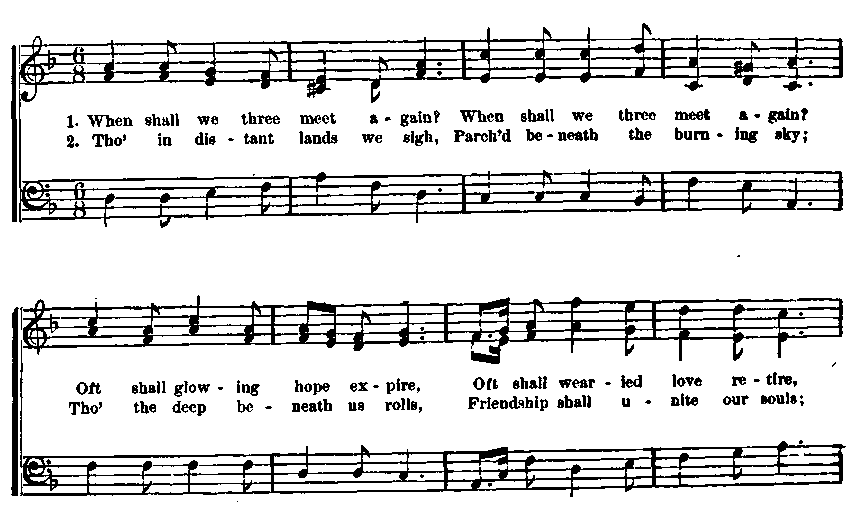Familiar Songs - Their Authors & Histories
300 traditional songs, inc sheet music with full piano accompaniment & lyrics.
| Share page | Visit Us On FB |
|
WHEN SHALL WE THREE MEET AGAIN? |
643 |
||
|
his widow and infant son. Mrs. Webbe was rendered so destitute that she was obliged to deny her son education, and when he was but eleven years old to apprentice him to a cabinet-maker. This business he hated, and though he knew not a note of written music, his fondness for the art led him to undertake to copy it. He copied from five in the morning till midnight. He also studied French, Hebrew, German, and Latin, and finally employed an Italian music-master, after which he attempted composition. His music was received warmly, and he became a favorite teacher. He made numberless songs, anthems, masses, etc., including the music of "When shall we three meet again?" which is spoken of as his " celebrated glee."
Dr. Horsley was a well-known English composer, born thirty years later than Webbe, whose pupil he was. He either made a new composition for the words of this song, or re-arrranged his teacher's air. The former supposition is more probable, as two different airs are given.
Where the song appears in these English collections there is no definite information as to the authorship of the words; but one of the three attributes them to " a lady." Is it not probable that the glee was written before the words which accompanied it? The words seem like those of some one leaving home for a foreign land, expecting years of absence. May it not be that they were written by the wite of an English missionary who was about to accompany her husband to his distant work? At any rate, the song was no dOURt written in England and brought to this country when Dartmouth College was in its infancy. The first Indian graduates, met in the "bower" for their farewell, might recall the song, but would desire to have something a little more expressive of their circumstances. One of their number would write the stanza which Indicates Indian origin, and the song might pass as his own, without such intention on his part. In corroboration of this, is the fact that that stanza is not contained in the English versions, and is very greatly inferior to the rest in poetic merit. The song was no dOURt sung again at Williamstown, and by the same method by which a shrewd saying has been fastened in turn upon each college president in the country, it would be easy to transmit the supposed authorship of this song from the Dartmouth students who added a stanza to the Williams students who sang it on a memorable occasion.
Harmonized by Edward S. Cummings. |
|||
 |
|||